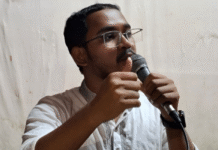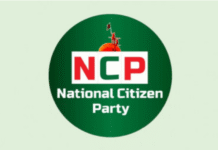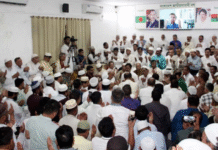Meltdown follows polarization, beacons dangers

(From left clockwise) Chief Election Commissioner KM Nurul Huda and Election commissioners Rafiqul Islam, Mahbub Talukder, Kabita Khanam and Shahadat Hossain Chowdhury. Image credit: Bdnews24.com
Shahid Islam 22.10.2018
It’s heading towards a train wreck. After years of calmness marked by intentional silence and behind-the-scene planning, a strong opposition alliance has coalesced itself almost like an army unpredictably pouncing on its enemy to attain both surprise and success.
Under the lead of internationally famed Dr. Kamal Hossain, this new opposition bandwagon is a utilitarian heavyweight; capable of dislodging the incumbent regime with an assessed 60 per cent popular votes, if the upcoming election is a fair one by the minimal standard.
Unraveling of vital institutions
Does this almost unprecedented polarization have anything to do with the unraveling of the vital institutions of the nation which have been rendered almost dysfunctional by years of partisan moulding and patronization? If not, why an Election Commission (EC) member walks away from a scheduled meeting, blaming the constitutional body empowered to conduct the polling for stifling his voice?
“Freedom of expression” is blocked, said Commissioner MahbubTalukder, as he walked away from a scheduled EC meeting on Monday. He is now on his way to the USA on temporary leave, as he claims, but rumours abound that, like the former Chief Justice SK Sinha, his departure from the country is an‘adieu under coercion’ of the power that be.
Sources say Commissioner Mahbub failed to put before the EC the crystalized sentiments of the voters on how the power of the incumbent MPs be reined in to ensure label playing field for all the participating contenders in the election; how the deployment of the military be structured and staggered to ensure they have the judicial power to punish those hell bent on disrupting polls by vote rigging and muscle-wielding? And, why the use of the Electronic voting Machine (EVM) not be altogether scuttled due to the irritation and the inconvenience it will have created to untrained, mostly illiterate voters?
The EC, reportedly under the influence of the bosses desirous to control it to cling onto power, shelved aside Mr. Talukder’s these and other agenda-points and, stirred his dissent; leading to his boycotting the meeting. Where does this single incident leave the credibility of the EC as a neutral body to act as a referee in the electoral game is now anybody’s guess.
Gaffe and the gunner
In Bangladesh, the election time invariably ushers in the potent occasion for the country’s armed forces to act as neutral sentinels to ensure the prevention of foul-playing, mostly by ruling party thugs; who often indulge in vote rigging with help from partisan, corrupt, police and other security forces. This time, to make things worse, a sleazy controversy relating to the army chief, General Aziz Ahmed, a decorated gunnery officer, is further poisoning the air.
Days ago, renowned civil society activist and freedom fighter Dr. Zafrullah Chowdhury divulged in a TV talk show that the army chief had once faced court martial due to some arms having been lost from the armoury of the unit he once commanded. Dr. Chowdhury later amended his statement by stating: “General Aziz faced a court of inquiry, not a court martial,” and, it was a ‘gaffe’ meant not to undermine the General’s stature or credibility.
The army too rebutted Dr. Chowdhury’s claim, but not without simultaneously initiating a complaint (GD) against him with the police, which the police accepted as a crime of sedition. Besides, Dr. Chowdhury is being sued in another allegation of land grabbing.
And, combined with the EC’s exposed credibility crisis following Commissioner Mahbub’s walkout from the scheduled EC meeting, there is a discernible meltdown of the nation’s vital institutions that the voters and the observers find too disconcerting to live with.
Facts vs. fictions
As if the situation is not molten enough to jolt the nation into a pinpricked numbness with respect to what may unfold in coming days— when the government is in no mood to comply with the combined opposition alliance’s seven point demands as the ‘minimum prerequisites’ to joining the poll—the PM had added more combustive elements to this burning cauldron.
In gatherings arranged to unveil the plaques to the Padma Bridge under construction, the PM accused the BNP and the Jamaat for being behind the 2009 BDR mutiny; the incarcerated BNP chairperson Khaleda Zia of being a ‘murderer’ and, being behind the August 21, 2004 grenade attack on the AL rally; and of money laundering and other crimes of grand larceny by Khaleda’s family members.
Any PM of any nation is presumed to be well informed of the facts, not the fictions that often dwarf facts of irrefutable colossus. If the PM is certain and sanguine about the BNP and the Jamaat’s involvement in the BDR mutiny—which she conjectured with Khaleda Zia’s leaving her cantonment house more than an hour before the mutiny began—why Khaleda was not implicated as one of the accused in the raft of the cases under process relating to the BDR mutiny? And, what prevented her name from an inclusion into the August 21 grenade attack case in which her son Tarek Rahman had lately been sentenced with life-long imprisonment?
Face off, and the Armageddon
These are few of the tell-tale signs that once again reveal the depth of revulsion and the irreconcilable stances that fashion the inner alchemy of the two major political parties; emotionally and politically. More than the BNP, the AL thinks they are the creator and the irreplaceable, indispensable, master of this nation. For them, even a smidgen of flexibility or compromise is out of question. That’s a stance that bellicose warriors take; not seasoned, patriotic politicians willing to walk miles to preserve peace, happiness and tranquility in the society they live in and lead.
In the final analysis, are we talking of an Armageddon awaiting to undo our nation – state by robbing it of the remnant of the democracy, the rule of law, and the fundamental ethics of governance by the consent of the majority? Perhaps we are. For the election is barely months away; the EC is in topsy- turvy; the police and other security forces are so much detested by the people that anything they do, even with good intent, is an instant suspect. And the state of the bureaucracy and the media? Here is the story.
Busted bureaucracy, beheaded media
A privately conducted survey revealed lately that over 78 per cent of the BCS officers recruited since 2010 have Chhatro League (AL’s student organ) background. How could that happen in a system that is supposed to be talent-based? One argument could be: all meritorious students are in the Chhatro League; which is fallacious, spurious, and nothing but sheer distortion of facts.
Now that these bureaucrats will act as the returning and other key officials in the ensuing polls, can voters trust them as being fair and neutral? Can voters also trust the PM, her cabinet, and the virtual one party parliament to be the custodian of the poll time governance?
Above all, can voters trust the government of the day for allowing the mass media to depict and disseminate the truths before, during and after the election amidst the dreaded, dangling, Digital Security Act (DSA) that even allows police to confiscate a journalist’s computer, or arrest him for composing something long before it gets published? Simply put: the DSA has beheaded the media, period.
No wonder our editors have been begging to the government that such laws not be enacted. But the government—that thinks it has the monopoly over the truth—is not willing to budge; as it shows equal or more stubbornness in conceding that a credible election can only be held under a neutral, caretaker regime; a fact for which it had fought tooth and nail while being in the opposition.
Wilting vulnerabilities
These are factors that lay open the wilting vulnerabilities of our internal politics, and pave ways for external intervention to sip in. That’s because we forgot that our bureaucracy must quench, neutrally, the demands of the masses; our military must remain trustworthy enough to stand for the national sovereignty and national security as neutrally as an avid judge will weigh over the merits of the facts laid before him to reach upon a fair verdict. And, our EC should have intervened when so many Deputy Commissioners (DC) were posted on the eve of the election to various districts from various ministries and the PMO; where they have been personal staffer of the incumbent ministers and the PM. Didn’t that constitute an irrefutable conflict of interest?
Unless such brazen madness and insatiable crazes to cling onto power by any means are reined in for the greater interest of the nation, the days ahead will invite daunting dangers of the kinds that no government, however entrenched and powerful, can surmount or subvert.
Shahid Islam is a globally acclaimed poet, novelist, political analyst, and practitioner of international laws. Author of 11 books and over 5,000 articles, he’s also a former military officer and diplomat.
The article appeared in the weekly Holiday on 19 October 2018









